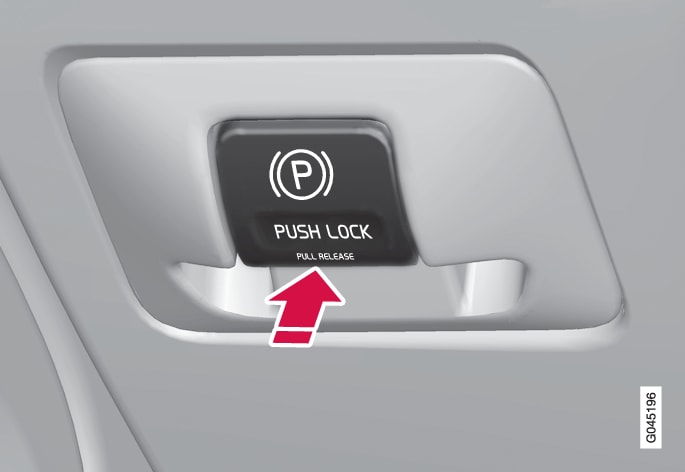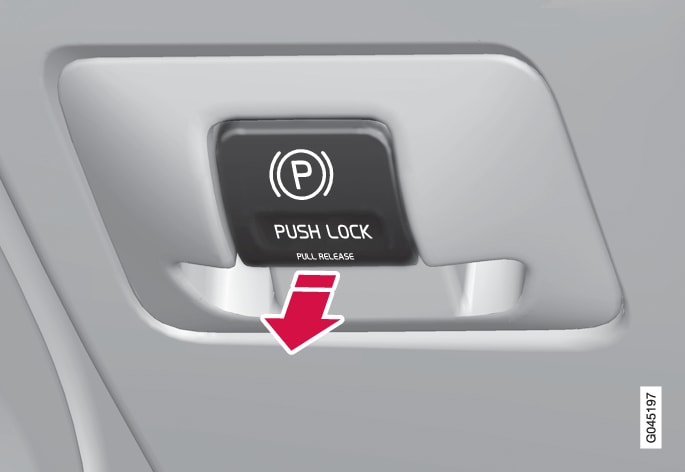Function
A faint electric motor noise can be heard when the electrical parking brake is being applied. The noise can also be heard during the automatic function checking of the parking brake.
If the car is stationary when the parking brake is applied then it only acts on the rear wheels. If it is applied when the car is moving then the normal foot brake is used, i.e. the brake acts on all four wheels. Brake function changes over to the rear wheels when the car is almost stationary.
Low battery voltage
If the battery voltage is too low then the parking brake can neither be released nor applied. Connect a donor battery if the battery voltage is too low, see Jump starting with battery.
Applying the parking brake

 The combined instrument panel's symbol starts flashing - once there is a constant glow the parking brake is applied.
The combined instrument panel's symbol starts flashing - once there is a constant glow the parking brake is applied.- When parking the vehicle, always engage 1st gear (for manual gearbox) or put the gear selector in position P (for automatic gearbox).
Emergency brake
In an emergency the parking brake can be applied when the vehicle is in motion by pressing and holding the control for PUSH LOCK/PULL RELEASE. The braking procedure is stopped when the control is released.
Note
Parking on a hill
If the car is parked facing uphill:
- Turn the wheels away from the kerb.
If the car is parked facing downhill:
- Turn the wheels towards the kerb.
Warning
Disengaging the parking brake

Cars with manual gearbox
Releasing manually
 The parking brake releases and the combined instrument panel's symbol extinguishes.
The parking brake releases and the combined instrument panel's symbol extinguishes.Note
Releasing automatically
 The parking brake releases and the combined instrument panel's symbol extinguishes.
The parking brake releases and the combined instrument panel's symbol extinguishes.Cars with automatic gearbox
Releasing manually
 The parking brake releases and the combined instrument panel's symbol extinguishes.
The parking brake releases and the combined instrument panel's symbol extinguishes.Releasing automatically
 The parking brake releases and the combined instrument panel's symbol extinguishes.
The parking brake releases and the combined instrument panel's symbol extinguishes.Note
Heavy load uphill
A heavy load, such as a trailer, can cause the car to roll backward when the parking brake is released automatically on a steep incline. Avoid this by depressing the control while driving off. Release the control when the engine achieves traction.
Replacing the brake linings
The rear brake linings must be replaced at a workshop due to the design of the electric parking brake - an authorised Volvo workshop is recommended.
Symbols and messages
For information on how the combined instrument panel's text messages can be shown and deleted, see Messages - handling.
| Symbol | Message | Meaning/Action |
|---|---|---|
 | "Message" |
|
 | A flashing symbol indicates that the parking brake is applied. If the symbol flashes in any other situation then this means that a fault has arisen.
| |
| Park brake not fully released | A fault is preventing the parking brake from being released:
If the fault persists after a few attempts:
Note: A warning signal sounds if the journey is continued with this error message. | |
| Parking brake not applied | A fault is preventing the parking brake from being applied:
If the fault persists after a few attempts:
The message is also illuminated on cars with manual gearbox when the car is driven at low speed with the door open in order to alert the driver that the parking brake may have been unintentionally disengaged. | |
| Parking brake Service required | A fault has arisen:
If the fault persists after a few attempts:
|
- If the car has to be parked before a possible fault has been rectified, then the wheels must be turned as if parking on a hill and 1st gear engaged (manual gearbox) or the gear selector must be in position P (automatic gearbox).
A text message can be acknowledged by briefly pressing the OK button on the direction indicator stalk.